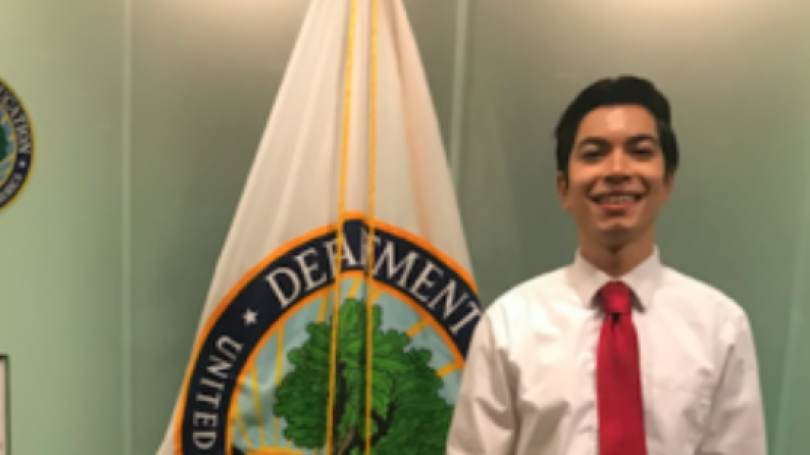
- Public Policy
- Leadership
- Funding
- News & Events
- About the Center
Back to Top Nav
Back to Top Nav
Back to Top Nav
Back to Top Nav
Juan Quinonez Zepeda '22 interned at the White House Initiative on Educational Excellence for Hispanics during the 2019 summer term. The following is an excerpt from his internship report.
This past summer I interned at the White House Initiative on Educational Excellence for Hispanics. During my time at the Initiative, I had many small-scale tasks such as a 2 page blog post about my personal experience as a freshman in college, brainstorming and finalizing critical questions for one of our White House Summits, and I even served as a note-taker and photographer for a Summit. However, my large-scale tasks included contributing to, editing, and condensing a 32 page First-Year Guide for Hispanic students to 22 pages, serving as a correspondent between the White House and the Initiative to problem solve last minute mistakes that could have prevented over 10 Senior Advisors from other agencies from attending our first summit, designing a bulletin board design on Hispanics in Stem that will be presented on September during Hispanic Heritage Month, and serving as a panel monitor for a $24,000,00 grant designated for Hispanic Serving Institutions.
Moreover, the three most positive parts of my internship were being tasked with such important projects, being trusted to be a correspondent between White House Staff and my Initiative, and working aside a cohort of empowering fellow interns. As previously stated, I was initially worried that I would not be kept occupied through my work. However, the task that was the most rewarding was being tasked with such important projects and genuinely contributing to the work that Initiative does. Another positive aspect was being assigned as a correspondent between White House staff and my Initiative. I was assigned with this task, after impressing my supervisor by displaying initiative in assuring that senior advisors from government agencies were not left outside the White House due to a White House computer error. Although it was a stressful situation, I excelled in it, and my initiative was well recognized by those senior advisors, my supervisor and my fellow interns. Finally, my fellow interns turned out to be the most rewarding part of my internship. I was surprised by how compatible we were and how we worked together as a team. They made me feel comfortable, and I became great friends with all of them.
Before, commencing my work at the Initiative, I had an interest in education policy, but I did not have first-hand experience with it. Since completing my internship, I feel assured that I wish to pursue a career in educational policy. However, now I realize that I want to do this work at a local level, as opposed to the federal level. I came to this conclusion, because I realized that at the local level, I will be able to more directly impact my state, Mississippi, as opposed to the federal level. Thanks to this internship, I will continue to pursue a minor in Education at Dartmouth, and I look forward to this Fall where I will take Education 001 and being able to contribute what I learned from my internship, which include topics such as how to deal with imposter syndrome, possible mental health situations that may arise and how to find aid, resources to locate on campus in an array of multiple situations, a section for non-traditional students, a section for commuters, a financial aid section, and many other sections. I am extremely thankful for the grant that I received from the Rockefeller Center. Thanks to their generosity, I was able to explore my career interest in public policy and receive a head start on my career aspirations! I am also grateful for the mentorship I received from Rocky.
The Rockefeller Internships Program has funding for Dartmouth undergraduate students to help defray the cost of living expenses associated with a full-time, unpaid, leave-term internships in the fields of public policy, public affairs, and social entrepreneurship.